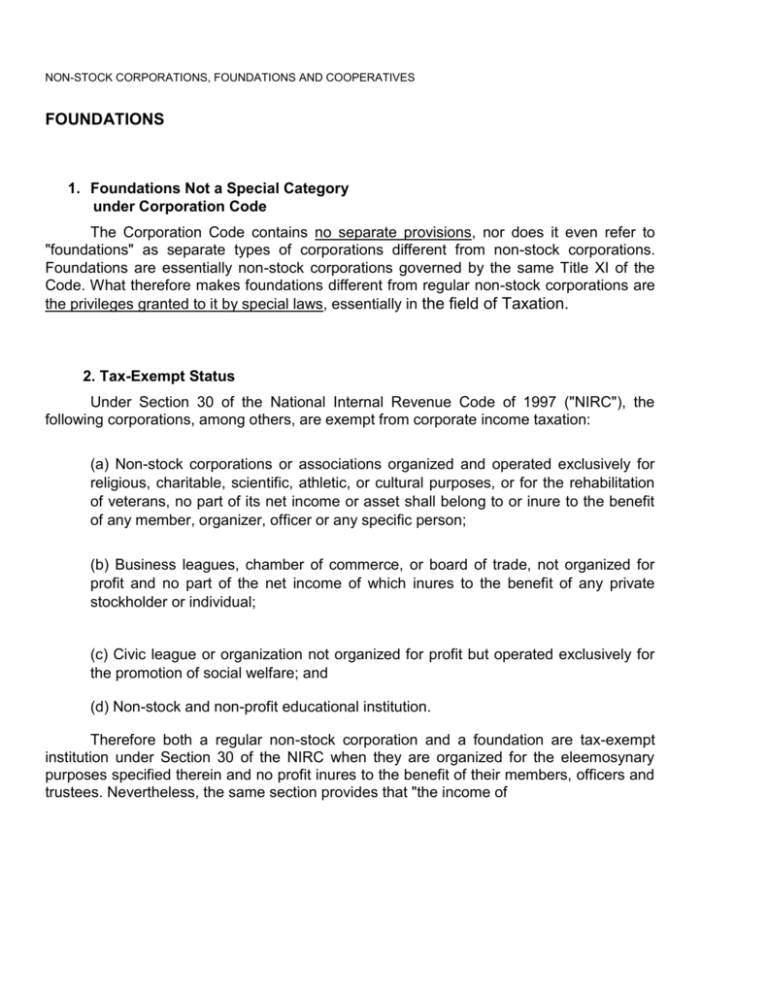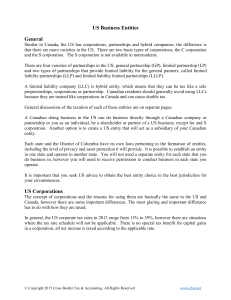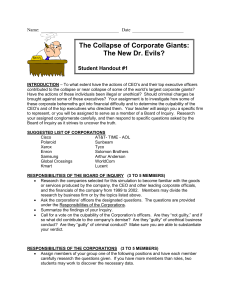Atty Cortina study - CleanEnergy Solutions International
advertisement

NON-STOCK CORPORATIONS, FOUNDATIONS AND COOPERATIVES FOUNDATIONS 1. Foundations Not a Special Category under Corporation Code The Corporation Code contains no separate provisions, nor does it even refer to "foundations" as separate types of corporations different from non-stock corporations. Foundations are essentially non-stock corporations governed by the same Title XI of the Code. What therefore makes foundations different from regular non-stock corporations are the privileges granted to it by special laws, essentially in the field of Taxation. 2. Tax-Exempt Status Under Section 30 of the National Internal Revenue Code of 1997 ("NIRC"), the following corporations, among others, are exempt from corporate income taxation: (a) Non-stock corporations or associations organized and operated exclusively for religious, charitable, scientific, athletic, or cultural purposes, or for the rehabilitation of veterans, no part of its net income or asset shall belong to or inure to the benefit of any member, organizer, officer or any specific person; (b) Business leagues, chamber of commerce, or board of trade, not organized for profit and no part of the net income of which inures to the benefit of any private stockholder or individual; (c) Civic league or organization not organized for profit but operated exclusively for the promotion of social welfare; and (d) Non-stock and non-profit educational institution. Therefore both a regular non-stock corporation and a foundation are tax-exempt institution under Section 30 of the NIRC when they are organized for the eleemosynary purposes specified therein and no profit inures to the benefit of their members, officers and trustees. Nevertheless, the same section provides that "the income of 756 PHILIPPINE CORPORATE LAW whatever kind and character of the foregoing organizations from any of their properties, real or personal, or from any of their activities conducted for profit, regardless of the disposition made of such income, shall be subject to tax imposed under this Code." Under Section 34(H)(2)(c) of the NIRC, the definition of foundation is preceded by the qualifying term "non-government organization" which means a non-profit domestic corporation. This tax-exempt status of ordinary non-stock corporations and foundations only pertain to income earned from pursuing their eleemosynary purposes, and not to other profit-seeking venture outside of their main purpose. Under existing revenue regulations, in order for regular non-stock corporations and foundations to establish their tax-exempt status, and thus be relieved of the duty of filing income tax returns and paying income tax, it is necessary that they file an affidavit with the Commissioner of Internal Revenue showing the character of their organizations, the purpose for which they are organized, their actual activities, the source of their income and the disposition thereof, and whether or not any of the income is credited to surplus or inures or may inure to the benefit of any private stockholder or individual.55 It has been held, however, in Collector v. V G. Sinco Educational Corporation,56 that the formal requirements of Revenue Regulations No. 2 are not mandatory and that an entity concerned may, in the absence of compliance with such requirements, still show that it falls under the provisions of Section 26 of the NIRC. From the point of view of tax-exemption, foundations enjoy the same privilege, and must undertake the same application process with the BIR to enjoy such privilege, as with regular non-stock corporations. 3. Charitable Contributions Under Section 34(H)(1) of the NIRC governing the computation of taxable net income, taxpayers re allowed to deduct from their taxable gross income contributions and gifts actually paid and made NON-STOCK CORPORATIONS, FOUNDATIONS AND COOPERATIVES 757 within the taxable year "to domestic corporations or associations organized and operated exclusively for religious, charitable, scientific, youth and sports development, cultural or educational purposes or for the rehabilitation of veterans, or to social welfare institutions, no part of the net income of which inures to the benefit of any private stockholder or individual." The extent by which a taxpayer may deduct from his taxable net income the charitable contributions and gifts to regular non-stock corporations organized for any of the purposes enumerated in Section 34(H)(1) is as follows: (a) For individual taxpayer, 10% of his taxable net income derived from business; and (b) For corporate taxpayers, 5% of taxable net income de rived from business. On the other hand, under Section 34(H)(2)(c ) contributions and gifts made to “foundation “ or “non-government organization” may be deductible in full by the taxpayer from his taxable gross income. It actually is Section 34(H)(2)(c), which now refers to "foundations" as "accredited non-government organizations," and defines and distinguishes them from other corporate entities, as follows: (a) Non-profit domestic corporation, formed and organized under Philippine laws; (b) Organized and operated exclusively for scientific, research, educational, character-building and youth and sports development, health, social welfare, cultural or charitable purposes, or a combination thereof, no part of the net income of which inures to the benefit of any private individual; (c) Which, not later than the 15th day of the third month after the close of the corporation's taxable year in which contributions are received, makes utilization directly for the active conduct of the activities constituting the purposes or function for which it is organized and operated, unless an extended period is granted by the Secretary of Finance in accordance with the rules and regulations promulgated. 758 PHILIPPINE CORPORATE LAW (d) The level of administration expense of which, shall on an annual basis, conform with the rules and regulations to be prescribed by the Secretary of Finance but in no case to exceed thirty percent (30%) of the total expenses; and (e) The assets of which, in the event of dissolution, would be distributed to another non-profit domestic corporation organized for similar purpose or purposes or to the State for public purpose, or would be distributed by a court to another organization to be used in such manner as in the judgment of said court shall best accomplish the general purpose for which the dissolved organization was organized. It will be noted therefore that a foundation or accredited non-government organization is for practical purposes a creature fashioned under NIRC for purposes of tax administration. The requirements laid-down by Section 34(H)(2)(c) put more stringent requirements on the foundation as compared to a regular non-stock corporation, namely: (a) The limitation of administration expenses to 30% of the corporation’s total expenses; and (b) The strict form of distribution of the net assets of the corporation in the event of dissolution to similar non-stock corporations or to the State (whereas, it is legal for regular non-stock corporations to distribute their net assets to the members or even to other entities organized for profit). In exchange for such stringent requirements, donations, contributions and gifts to foundations are totally deductible by the tax- payer from his tax gross income, while those to regular non-stock corporation are subject to the 10%-5% limitations for their deduction from the taxable gross income of a taxpayer. Theoretically therefore, taxpayers would have greater motivations to donate and contribute to foundations than to regular non-stock corporation because of the greater tax benefit to them. NON-STOCK CORPORATIONS, FOUNDATIONS AND COOPERATIVES 759 The direct benefit granted under Section (34)(H)(2)(c ) Whether the entity is a foundation or a regular non-stock corporation does not really matter since all donations to them are equally tax-exempt. In fact, the foundation is at a greater disadvantage as compared to a regular non-stock corporation, since a foundation is subject to the 30% limitation on its administration expenses, whereas a regular non-stock corporation is not saddled by such limitation. In addition, a foundation is mandated with greater reportorial obligations to the SIR than the regular non-stock corporation since it has to make not later than the 15th of the third month after the close of its taxable year a detailed report. 4. Application by Foundations with BIR For a foundation to qualify for full deduction under SIR-NEDA Regulations No. 1-81, as amended, it must file with the Government and Tax Exempt Corporation Division of the SIR a sworn statement showing the character of the organization, the-purpose for which it is organized, its actual activities, the sources of income and its disposition; and other facts relating to their operations which are relevant to their qualification as donee institutions. Once the foundation is qualified as a donee institution by the issuance of BIR Certificate of Registration, It must issue certificates of donations in the form prescribed by the SIR on every donation or gift it receives within thirty (30) days from receipt of the donation. 5. In Summary For purposes of Corporate Law, with respect to corporate powers and capabilities, and rules on internal management and membership relations, there are no distinctions between foundations and regular non-stock corporations, and there is no advantage enjoyed in this realm by foundations over regular non-stock corporations. In fact, a foundation would suffer a diminution of the extent of power by which to distribute its net assets in the event of dissolution, as compared to a regular non-stock corporation. In the realm of income taxation, both a foundation and a non-stock corporation can equally enjoy tax-exempt status. When it comes to charitable contributions, a foundation is limited in the manner by which it disburses the same by the 30% limitation on its administrative expenses, whereas no such limitation applies to regular non-stock corporations. In addition, both the donors to, and the management of, foundations are saddled with reportorial requirements on donations given and received, as the case may be. On the other hand, because donations to foundations which have qualified as donee-institutions are deductible in full, there may be greater motivation from benefactors to give to foundations rather than to a regular nonstock corporation.






